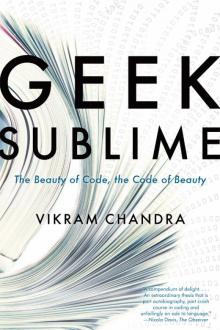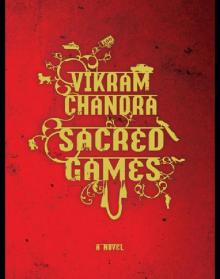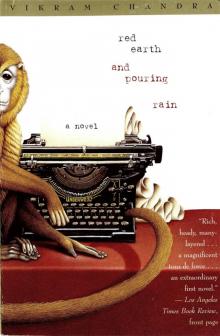- Home
- Vikram Chandra
Red Earth and Pouring Rain Page 14
Red Earth and Pouring Rain Read online
Page 14
Using influence, hints, bribery, cajolery, flattery and occasional veiled threats, he inveigled a series of appointments that led through the concentric layers of the fortress towards the central, protected sanctuary, where the high-born women sang their songs and constructed subtle intrigues designed to acquire influence over princes and heir-apparents. The angling towards the centre was slow, hard work; below, on the plain, the armies of the Company spread like a creeping ooze, meeting, blending and spreading until they ringed the fortress, settling in for the long business of attrition, for the heavy grinding and chewing that is the main ingredient of the restrained art of the siege, which precludes the quick passion of reduction.
Several times, while on sentry duty in the third watch, when the camp-fires below —carpeting the plain like a sudden growth of seasonal flowers —had ebbed to a dull glowing crimson, when the night brought that especially bitter taste of loneliness and clear-headed perception of failure that comes in the hours just before morning, Thomas thought of revealing himself, of declaring himself to be Jahaj Jung. He dreamt of being promoted despite the stories of defeat at the hands of Reinhardt the Sombre, of suddenly being talked about in the corridors of the Rani Mahal. Perhaps, then, there might follow some wild chance, some god-given opportunity to see her again, to talk to her; but Jahaj Jung would undoubtedly be sent to the outer parapets, where shells breached walls and besiegers flung themselves forwards in forlorn hopes, while an anonymous sentry could stay near the centre, near the unobtainable heart, and so he stayed quiet, and remained at his post, obsessed.
By the time Thomas had worked his way to the outermost gates of the Rani Mahal, the plains below were riddled with tunnels and trenches, zig-zagging towards the fortifications; by night, the besiegers pick-axed and spaded, mole-like, and the defenders on the walls listened to the sounds of metal biting into earth, the clinking of iron on stone, the rustling of scurrying feet, and they calculated distances and directions, and lobbed shells into the darkness. In the fortress the price of grain spiralled and cheekbones edged their way out, casting shadows onto paling skin, but Thomas became glowingly confident, because he now stood guard at a gate where the princesses’ dolis passed by every morning and afternoon: it was impossible that she was not in one of them, that she did not see him. So every morning, he waited eagerly for the cry of the palanquin-bearers, ‘huh-HAH-huh-HAH-huh-HAH-huh-HAH’; below, parties of defenders sallied out at dawn to surprise the parallels and siege batteries of the foe; at midnight, parties of sappers burrowed into each other’s tunnels and killed with glacions, picket posts, hammers, spades and stones, tore at each other, cursed, strangled, pressed faces into mud; the earth grew rich with the return of its elements; in the fortress, arms and armour became exceedingly cheap.
One afternoon, Thomas bought a graceful steel sabre, chased with silver on both sides of the blade: two rampant lions on one aspect, the words ‘The Red One,’ in Urdu, on the other. The next morning, while standing watch, he fancied he saw a quick movement in one of the dolis, a rippling of a curtain that caused a momentary crack. That same night he bought a polished and tufted helmet, nose-guard still stained on the inside by the crusty black blood of its former owner, who no doubt had caught a sniper’s ball through the eye, or a skirmisher’s arrow in the forehead, or a digger’s pick-axe under the chin. Thomas appeared on his next watch resplendent in his new helmet, equipped with the flashy sabre, studiously ignoring the sneers of his fellows, and this time, no doubt about it, there was an unmistakable flutter of feminine interest behind the brocade as the dolis swayed through (the dark-skinned doli-wallahs, sweating and white-eyed, maintaining their steady trotting gait and even chant, HAH-huh-HAH-huh-HAH-huh-HAH-huh’).
Over the next week, Thomas enriched his equipage with a suit of chain mail that covered his whole torso, down to the thighs (with a barely-visible kinking, under the left arm, where there had been a hole); black plate armour that buckled around the body, covering both chest and back; grey steel plastrons that sat snugly over the forearms; dull-grey thigh-pieces with decorative engraving suggestive of leaves and creepers; red cavalry boots, sturdy but soft; a curving dagger with a green jade handle carved in the shape of a horse’s head and neck; a pair of horse pistols minutely etched with gold in an abstract Turkish design; a fawn leather wrist-guard; a composite bow made of wood backed with strips of horn, sinew and leather, varnished and covered with red cloth and tied in the middle and ends with gold thread; a stiff leather quiver and arrows, some tipped with quadrangular or blunt points, others like razor-edged leaves or crescents, and still others in the shape of wolves’ and tigers’ heads that screamed as they flew through the air. At night, in his charpoy, in that border-line area between sleep and wakening, Thomas felt, still, the weight of the metal on his limbs; his dreams were invaded by other men’s pasts, by the memories of things he had never seen or experienced, by languages so foreign that he had never heard the sounds in the words; in his sleep, he relived other men’s agonies, rejoiced with them in the explosion of fertility when the first rains soaked the ground, tasted the ashes of bitterness when loved ones died, worshipped the goddesses of spring, knowledge and small-pox; in the morning, when he first put on his equipment, each piece seemed to speak to him through his fingertips: the helmet hummed with the courage of a cavalryman born to the saddle, the chain mail reeked of the guilt-ridden rage of a rapist, the sabre buzzed with the white-hot, unreasoning rage of a berserker, the thigh-pieces tintinnabulated with the tenderness of a rissaldar well-loved by his men; at these times, Thomas thought he was being driven out of his mind, either by the strength of his infatuation with a girl he had seen only once, or by the anguish of the heat-maddened city. Nevertheless, he persisted; every day he was seen at his post, his huge body hung with the appliances of combat, like some over-equipped incarnation of Mars or —as he thought with his new-found knowledge —Kartikeya; the other men laughed, and one, an ancient Sikh, said, rubbing his stomach and grinning, ‘Ohe, what is this penance in this sun, this weight of metal? Why burn under that chain mail? They won’t get here for weeks, to this den of exquisite delicacy —we’re well-protected here, and this is what they —our fools down there —will fight like lunatics for, like madmen, when those out there come.’ Thomas looked away, towards the dark windows over the Sikh’s head, who went on, ‘Ah, I understand, a private oath, a warrior’s vow. What will you ask for then, when your god appears? Wealth? Love? No, look at you, it will be a soldier’s demand: like Hiranakashyapu, you’ll ask to be invulnerable; let me be deathless, you’ll say, let no man or animal be able to kill me, by day or night, out-of-doors or in; make me, you’ll say, hard as thunder.’ Thomas pushed past him, hearing, far away, ‘Huh-HAH-huh-HAH-huh-HAH-huh-HAH’; the dolis passed, leaving the air redolent with rose-perfume and sweat; Thomas turned, looking for the Sikh.
‘Eh, Iqbal Singh-ji,’ he called, ‘what happened to Hiranakashyapu? In the end?’
The Sikh was standing spraddle-legged on a parapet, urinating, enjoying the sight of his water curving through the sunlight and splattering on the rocks a hundred feet below. ‘He died,’ he said. ‘You don’t know? He killed so many that he thought nobody should worship anyone but him. But his son was a Vishnu-devotee, a most pious, priggish little brat, it sounds like. So Hiranakashyapu told his sister Holika to burn little Prahlad, and, holding him, she jumped into the fire, but she burnt instead. So then Hiranakashyapu drew his sword to kill the boy, and noticed Prahlad looking quite fearless, said, Are you mad, Prahlad said, My Lord is everywhere he will protect, and Hiranakashyapu thumped a pillar saying, Oh really is he here, and Vishnu emerged from the pillar, half-man, half-lion, at the hour of twilight, carried Hiranakashyapu to the lintel, so that he was half indoors and half out, and tore him open.’
Thomas laughed, a small uncertain giggle, and then they both ducked to the ground as a dark object whistled down from the sky, its shadow skimming over them; Thomas landed awkwardly, his body twisted, and looked up into the
snarling face of a small dog as it turned through the air, legs stiff and outstretched, it hit the ground and exploded, spraying black fluid and maggots.
’Sisterfuckers,’ the Sikh growled, rubbing at a stain on his pantaloons. ‘Motherfuckers.’
Thomas straightened up, clanking, and gingerly picked his way through the mess to where the dog lay, trailing entrails in which white worms moved slowly; its lips were twisted back from the teeth, the eyes very black and quite impenetrable. ‘Very close,’ he said. ‘Too close.’
‘They’re closer than I thought. They’ll be up here soon,’ the Sikh said. ‘It won’t be long now.’
So, in the height of that summer, in the time near the summer solstice, the Company began catapulting long-dead animal carcasses into the fortress; rotting-skinned calves and evil-smelling goats dropped in long, high arcs, thumping into rocks and dry grass. Now, disease spread; plagues raced through the stronghold, whittling down the already-denuded garrison; now, when red-hot shot set fire to roofs, it fed unopposed, gulping down homes and shops. In his basement room, Thomas was often awakened at night by the flat whump-whump-whump of mortars and confused shouting; he would twist on his charpoy, his legs hanging over the lower edge, mumble, glance sleepily at the armour and arms distributed around the bed in concentric circles (glinting, gleaming despite the darkness) and feeling a huge surge of satisfaction and confidence, fall back into a sleep delightfully burdened by palanquin-riding princesses.
One evening, Thomas swaggered through the bazaar, armed at all points, his long hair oiled, eyes outlined with kajal, a pink flower behind an ear; he walked past blackened gaps in the rows of shops, some still smoking, past empty houses, bedraggled courtesans calling without enthusiasm or hope from upper-storey windows, squeaking pigs feeding on corpses, groups of tea-drinking soldiers caught in that absolute silence that comes from absolute knowledge of impending disaster, streets clogged with debris, weeping children, families staggering under the weight of their quickly-bundled possessions, packs of sleek white dogs, threatening and feral.
‘Sahib. O Sahib. Wait.’
Thomas turned, flicking his hair over a shoulder; it was one of the many arms-sellers he had dealt with recently, a thin, nervous man with Shaivite caste-marks on his forehead.
‘I am going, Sahib,’ he said. ‘We will try to get out, tonight. But before I go, I thought, I must see the Sahib, only he will appreciate this. Look.’ He held out a two-and-a-half-foot length of heavy steel, worked at the top into curving petal-like flanges, crowned with an octagonal spike at the top of the bud. ‘Look. It is less a mace, more a thing a woman might love for its delicacy. Look at the workmanship of the handle. Look at the strength of the neck. One might be glad to fall under a blow from this, one might consider oneself blessed.’
‘Indeed,’ said Thomas. ‘It is pleasing to the eyes, with the curve of these, the boss and then the heavy straight line of the spike.’
‘I knew it. Only you could appreciate the worth of a piece like this. Call her Rose-of-the-Morning, Sahib. Bulbul-of-Heaven.’
‘Princess-of-the-Heart.’
‘Marvellous. Princess-of-the-Heart, indeed.’
‘How much?’
After the obligatory bargaining, Thomas carried his new possession home, swinging it to and fro, listening to the faint but clear whistling of air between its blunt blades. That night, he slept with it by his head, rubbing his palm over the cross-hatching on the hilt, liking its comfortable chill, and later turning, in his sleep, to rest his head against it, to taste, inadvertently, the electric bitterness of the metal. He awoke, suddenly, with dirt in his nostrils and mouth, ears ringing; there were voices, raised and hysterical, nearby, muffled by the yellow haze of plaster and dust shaken loose from the walls; Thomas began to strap on his buckler.
‘Come, brother. It is time.’ Iqbal Singh emerged from the murk, tying the drawstring to his pants.
‘What was it?’
‘A mine under the East Gate. It vanished, I hear, the whole gate.’
‘Of course.’
They ran up a narrow staircase; outside, the sky was coloured with the first hint of grey to the east, silhouetting the rush of figures, the faces of men, the rhythmic up-and-down of the battlements. ‘We live,’ Iqbal Singh said, ‘in very bad times.’
Then they rushed into the melêlée; in the jostling, heaving mass it was impossible to tell friend or foe, and so blows were exchanged anonymously, randomly, and bodies moved under foot, writhing, suffocated; Thomas used his weight, pushing his way through the crowd, flanked by Iqbal Singh, noting, curiously, the queer high-pitched sound emitted by the throng, its heavy, not-unpleasant odour of perspiration and fear, and the momentary glimpses —in the jumping red light of flames, the quick hot white flashes of pistol discharges —of bulging eyes, gaping mouths, hands, lips, elbows, eyebrows. Finally, they gasped for breath at the gate of the Rani Mahal, at their accustomed post. Above them, a thick column of pitch-black smoke grew thicker at the base, piling billow upon billow; the gate itself stood open, and a dozen men from the guard crouched by it, nervous and indecisive; below, a dense, rippling line of flashes marked the enemy’s advance party as it ascended, rolling up the defenders.
‘Close it,’ Iqbal Singh shouted. ‘Close it, fools.’
They strained at the gate, which moved, creaking, slow; something rang against the arch above, sprinkling them with a stinging cloud of marble chips, and a man dropped behind Thomas, exhaling breath in a quick whine; the gate closed, they struggled with the huge rusted bolt which squeaked and fought them, dropping large brown flakes on their feet, and just as it slid, protesting, through the first hasp, the gate sagged inward, reverberating like a gigantic diaphragm from ramming blows and shot.
‘Leave it,’ Iqbal Singh said. The echoing drum-beat sound chased them as they ran along a circular, rising passage-way, overlooked by balustrades and loopholed walls; then they were in the palace proper, racing through pillared halls and court-yards where red and green parrots squawked and flapped and fell out of branches; a figure appeared in a doorway, an obese, finely-dressed man holding a cavalry sabre awkwardly.
‘We’re your men,’ Thomas said.
‘Where are all the guards, all the rest?’ Iqbal Singh said.
‘No guards, it was all so sudden.’ He began to cry. The tears left shiny tracks down his puffy cheeks. ‘We didn’t even have time to put by wood for jauhar, it was all so sudden, so they all went out to the balconies at the back.’
‘Fool’s errand we came on,’ Iqbal Singh said. ‘They can’t char themselves, the great Rajput ladies, so they’ll fly like little birdies. Nothing to protect here, brother, let’s go home.’
But Thomas was already off, running, The Red One in his right hand and Princess-of-the-Heart in his left, and the others followed; they bolted through carpeted living rooms, under huge crystal chandeliers, and over silk-laden beds in apartments, up flights of stairs, past delicate stone screens, and then into a large hall —black-and-white tiles, Thomas saw in that first moment, and on the wall a painting, a large painting, a dancing woman, musicians —where on the other side a large group of women clustered about a series of balconies that opened out onto the valley below; he ran towards them, and seeing him come, one of them, an old woman, with white hair, pale skin, raised her foot, put it on the sandstone railing running around a balcony, and stepped, face quite without fear, into the air, and for a moment her yellow skirt, patterned with red, ballooned out around her, holding her up, it seemed, but then she dropped out of sight. Shouting, Thomas ran along the edge of the hall, herding them away from the balconies, away from the edge; he saw her and knew it was her, despite the voluminous ghunghat veiling her face: she was motionless, facing a balcony, back to a pillar, clutching it; he ran up to her, saw her head move beneath the cloth as she felt him approach, he reached up with the mace, notched a fold of the ghunghat with the spike, pulled it away, it was her, as the cloth fell away from her head her eyes were quite withou
t expression, the pupils dilated, the blood rushed to her skin, reddening, the cloth fell, Thomas heard a roaring, smoke, masonry collapsed, the cloth fell.
‘JAHAJ JUNG!’
Thomas turned, dazed, to see Uday Singh, his white beard blackened by soot, coming through a jagged hole in the wall in a crouching run, followed closely by a squat, ruddy-faced European in a green coat; oily smoke poured through the gap in the brick, sliding over the tiles; Uday moved sideways, crab-wise, relaxed but already stalking, presenting never more than a profile closely guarded by the oscillating point of a sword.

 Love and Longing in Bombay
Love and Longing in Bombay Geek Sublime
Geek Sublime Sacred Games
Sacred Games Red Earth and Pouring Rain
Red Earth and Pouring Rain